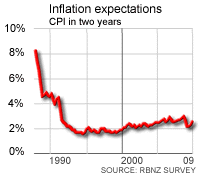 New Zealand business managers expect inflation to average 2.7% in two years time, with monetary conditions expected to ease next year, the Reserve Bank of New Zealand December Quarter Survey of Expectations found. Unemployment is expected to rise and the exchange rate is expected to remain at current levels.
The survey of 64 business managers from different sectors of the New Zealand economy showed that inflation was expected to be within the central bank's target band of 1-3% over the next two years. The expectation for inflation in one year's time was for it to average 2.8%.
The expected exchange rate at the end of the March quarter 2009 and in a year from now was around current levels - at US 55 cents, with the New Zealand dollar also expected to be at AUS 85 cents in March and AUS 82 cents in a year's time.
Banks tightened lending criteria over the last year as the global credit crunch intensified. Businesses are expecting easier access to money as the year progresses. Current monetary conditions are perceived as being tight, the RBNZ said, but they are expected to ease by half way through next year.
Average annual GDP in a year from now was expected to be positive: 0.3%, growing to 1.5% in two year's time.
Average unemployment in one and two years from now was expected to grow from current low levels to 5.5% and 5.7% respectively.
The expectation for inflation to average 2.8% a year from now was down from 3.6% from the one year expectation in the September quarter survey.
The RBNZ is widely expected to cut the official cash rate by 100 basis points to 5.5% on December 4, with some expecting a 150 basis point drop to 5%.
The Nielsen-run survey covered 64 business managers from 19 financial, 24 business, 7 agriculture, 5 labour and 9 other businesses.
New Zealand business managers expect inflation to average 2.7% in two years time, with monetary conditions expected to ease next year, the Reserve Bank of New Zealand December Quarter Survey of Expectations found. Unemployment is expected to rise and the exchange rate is expected to remain at current levels.
The survey of 64 business managers from different sectors of the New Zealand economy showed that inflation was expected to be within the central bank's target band of 1-3% over the next two years. The expectation for inflation in one year's time was for it to average 2.8%.
The expected exchange rate at the end of the March quarter 2009 and in a year from now was around current levels - at US 55 cents, with the New Zealand dollar also expected to be at AUS 85 cents in March and AUS 82 cents in a year's time.
Banks tightened lending criteria over the last year as the global credit crunch intensified. Businesses are expecting easier access to money as the year progresses. Current monetary conditions are perceived as being tight, the RBNZ said, but they are expected to ease by half way through next year.
Average annual GDP in a year from now was expected to be positive: 0.3%, growing to 1.5% in two year's time.
Average unemployment in one and two years from now was expected to grow from current low levels to 5.5% and 5.7% respectively.
The expectation for inflation to average 2.8% a year from now was down from 3.6% from the one year expectation in the September quarter survey.
The RBNZ is widely expected to cut the official cash rate by 100 basis points to 5.5% on December 4, with some expecting a 150 basis point drop to 5%.
The Nielsen-run survey covered 64 business managers from 19 financial, 24 business, 7 agriculture, 5 labour and 9 other businesses.
RBNZ survey: Inflation to 2.7% in 2 yrs, unemployment to 5.7%
RBNZ survey: Inflation to 2.7% in 2 yrs, unemployment to 5.7%
25th Nov 08, 5:06pm
by

We welcome your comments below. If you are not already registered, please register to comment
Remember we welcome robust, respectful and insightful debate. We don't welcome abusive or defamatory comments and will de-register those repeatedly making such comments. Our current comment policy is here.